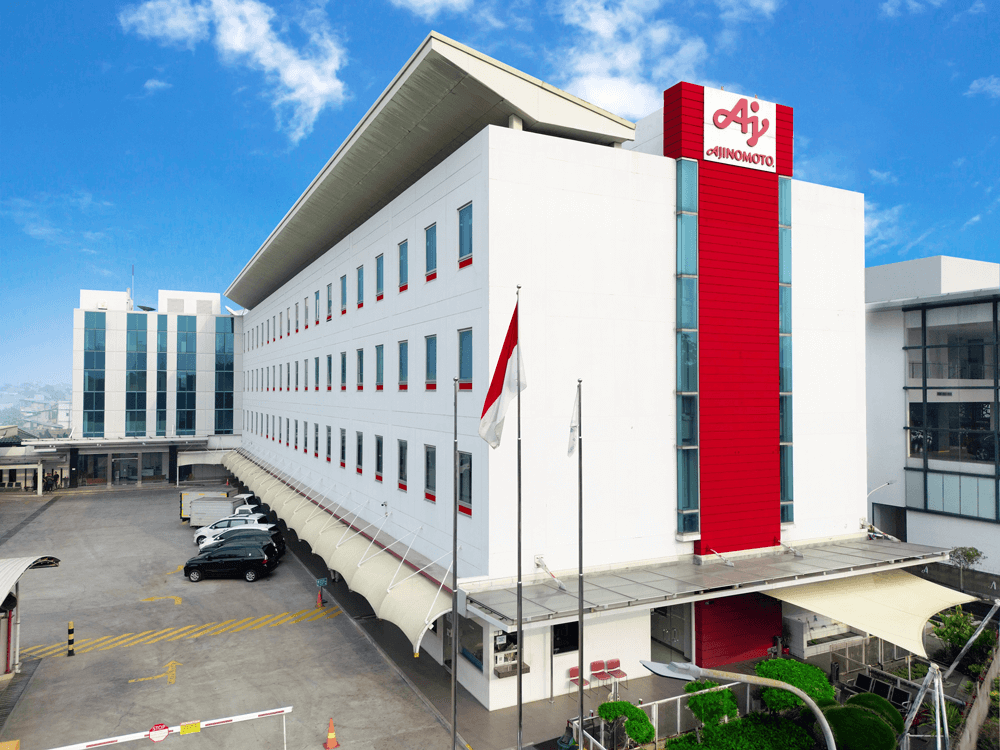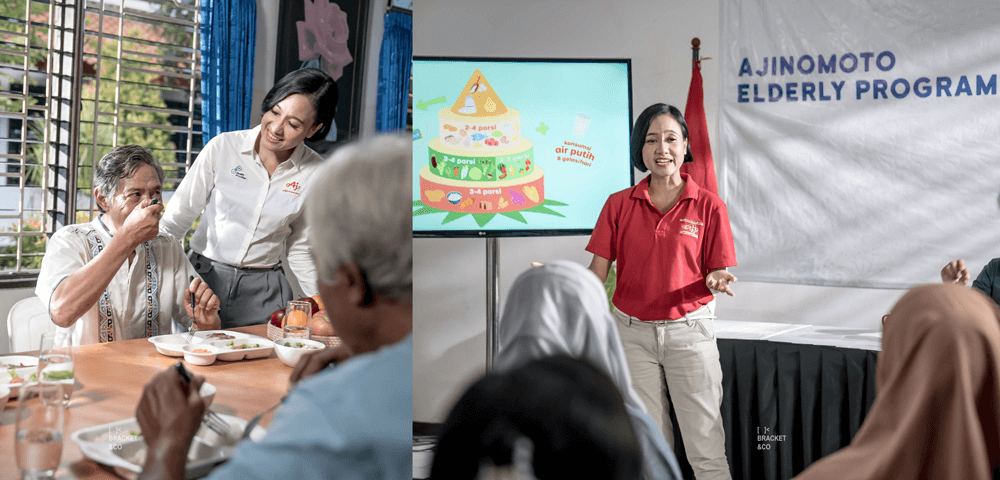Jakarta, Juli 2024 - The birth of AJI-NO-MOTO® MSG began with research conducted by Dr Kikunae Ikeda in Japan more than a century ago by extracting kombu (seaweed). In this research, Ikeda discovered other flavors besides sweet, bitter, sour and salty, namely umami. Umami comes from Glutamic Acid (a type of Amino Acid) which has function in carrying out metabolic processes such as the formation of proteins in the body. The Ajinomoto Group has been researching and applying the function of amino acids for over 100 years through a scientific approach known as “AminoScience”.
This discovery led to the creation of umami seasoning, namely MSG AJI-NO-MOTO®, which can help increase the deliciousness of food. "Creating delicious spices at affordable prices and turning simple but nutritious food into delicious food" - this is Dr Ikeda's dream which has spread throughout the world, including Indonesia.

Present in Indonesia since July 1969, the Ajinomoto Indonesia Group currently consists of 3 companies, namely PT AJINOMOTO INDONESIA, PT AJINOMOTO SALES INDONESIA, PT AJINEX INTERNATIONAL. Having been around for 55 years, Ajinomoto continues to innovate by presenting various product lines. Supported by more than 3500 experts and experienced staff spread from Sabang to Merauke, the Ajinomoto Indonesia Group helps people create delicious and nutritious food so that they can support the adoption of a healthy lifestyle. Apart from familiar cooking seasoning products such as MSG AJI-NO-MOTO®, Masako®, SAORI®, Sajiku®, Mayumi®, Ajinomoto presents its newest products: Ajinomoto Shrimp Paste Powder, Ajinomoto Gyoza, and aminoVITAL™. Apart from retail products, Ajinomoto also has products that can meet the needs of the culinary industry, such as: DASHIPLUS®, GARLICOPLUS, MEATUPPLUS. NIKUPLUS, KALDOPLUS®, AJINOMOTO® Chicken & Beef Powder are also presented to meet the needs of hotels, restaurants and catering.
"The Ajinomoto Indonesia Group, which is incorporated as an affiliate company of the Ajinomoto Global Group (Ajinomoto Co., Inc) which is headquartered in Japan, adheres to the Ajinomoto Shared Value (ASV) which focuses on the pillars of health, welfare, food resources and global sustainability. Through Ajinomoto's global slogan Eat Well, Live Well, Ajinomoto aims to continue making a big contribution to extending the healthy life expectancy of the Indonesian people, while also moving towards a sustainable, environmentally friendly business. In order to achieve this goal, Ajinomoto Indonesia is transforming all of its employees into Health Providers. "Health Provider is an integrated sustainability initiative from the Ajinomoto Indonesia Group, covering activities that support human health and environmental sustainability," said Naoto Minemura - President Director of PT AJINOMOTO INDONESIA.
55 years of faithfully accompanying Indonesian families, Ajinomoto is always committed to presenting quality and guaranteed halal products. This is proven by Ajinomoto's achievement in obtaining a halal certificate issued by the Halal Product Guarantee Organizing Agency (BPJPH) and LPPOM, as well as continuing to implement the Halal Guarantee System (SJH) in all its factories, and Ajinomoto has succeeded in maintaining the SJH certificate issued by LPPOM. Ajinomoto's commitment to maintaining halal products has been appreciated by several parties through several halal awards from several authorized agencies such as the TOP Halal Award (Masako®) from IHATEC (2022); Favorite Halal Brand (Masako®) from LPPOM (2023); TOP Halal Award (Brand Masako® & SAORI®) from IHATEC (2023). This achievement is very meaningful for the progress of Ajinomoto Halal Management and provides motivation and pride for the company to continue to meet the needs and expectations of the community as a top priority.
Ajinomoto Support to Expand Healthy Life Expectancy
For Ajinomoto, good nutritional intake is an important asset for the growth of future generations. Indonesian children need complete and balanced nutrition for mental and physical growth and development. So that Indonesia can grow into a strong nation. The School Lunch Program (SLP) is one of Ajinomoto's initiatives in improving nutritional intake to prevent malnutrition problems in school-aged children. We collaborate with the Bogor Agricultural Institute (IPB), and run the SLP program which we implement in several Islamic boarding schools. SLP has been running since 2018. Through this program, positive results were obtained with a reduction in the anemia rate of students by 20%, an increase in nutritional intake by 20%, an increase in nutritional knowledge by 50%. It doesn't stop there, we are also collaborating with the Department of Community Nutrition of IPB and the Ministry of Religion of the Republic of Indonesia to present an SLP guidebook which contains nutrition education, tips for program implementation, and various applications for delicious, balanced, nutritious menus, which are easy to apply, to provide provisions for continuing the program in the future.

Not only caring for school age children, Ajinomoto Indonesia also cares for the elderly through the Elderly Program. The initiation in 2021 will begin with research to find out whether providing a food program with balanced nutrition, high in protein, but low in salt, sugar and fat but delicious, can improve the nutritional status of the elderly, leading to an increase in their quality of life. In the research, which was located in a nursing home in the Yogyakarta area, Ajinomoto collaborated with a nutritionist from one of the state universities in Yogyakarta. After being given a nutritious and low-salt food menu intervention, there was a significant reduction in the elderly's blood sugar levels. The low salt menu given to the elderly through this program has been proven to reduce blood pressure in the elderly, namely SBP (Systolic) and DPB (Diastolic). The good results from this research were then used as a reference for disseminating the Elderly Program to other nursing homes and the community.
Ajinomoto Indonesia also consistently holds a series of educational activities on health topics regarding the use of umami in MSG in food. Umami in MSG can be used as a flavoring to improve the taste of food, thereby helping to encourage increased nutritional intake and also helping to reduce the use of salt in food. The use of MSG in food can support a low-salt diet strategy, thereby helping to control excessive sodium intake which can pose a risk to heart health and blood pressure.
The role of MSG in a low salt diet strategy is also supported by several scientific journals. In the scientific journal, it is stated that reducing the use of table salt and adding a little MSG to cooking can reduce sodium levels by as much as 30 percent, because the sodium content in MSG is only 1/3 of the sodium content in ordinary table salt. Ajinomoto packaged this information in the Smart Salt campaign. Applying Smart Salt in daily cooking activities is very easy, just reduce some of the salt used and replace it by adding MSG. For example, when cooking chicken soup, from what we usually pour 2 teaspoons (tsp) of salt into 1 liter of soup, just change it to 1 tsp salt + ½ tsp MSG, with these tips, we can make the food still delicious even if the salt is reduced .
In order to reach a wider community, Ajinomoto Health Provider is holding GEMBIRA (Nutritious Cooking Movement with Ajinomoto Health Providers), an educational activity related to the application of the concept of balanced nutrition and Smart Salt accompanied by cooking practices, so that it is closer to the daily lives of the target participants, namely PKK mothers. Currently, GEMBIRA that has been held since 2022, and held in 20 cities, and also attended by more than 5,900 PKK cadre women.
Apart from various education and programs, Ajinomoto Indonesia also innovates in creating products that support people in adopting a healthy lifestyle. For example, our newest product from the Sajiku® Brand has innovated to create the Sajiku® Seasoned Flour variant that absorbs less oil which is a solution for people to make fried food menus without worrying about consuming excess oil. Then we also innovated to create a Masako® Light variant which has lower sodium (salt) levels, so it can help people control their salt intake.
Ajinomoto's Efforts to Preserve Indonesia's Environment
Apart from working to extend the healthy life expectancy of Indonesian people, Ajinomoto also contributes to improving environmental problems such as poor air quality and plastic waste management. One of the efforts to reduce environmental pollution to zero (Zero Waste) is carried out at the Ajinomoto Factory by increasing production efficiency from upstream to downstream in the existing production process. Upstream, with its technology, Ajinomoto uses raw materials effectively and is also efficient in water use. In this process until it reaches the downstream, namely the manufacture of the main product, Ajinomoto processes waste from the production process into side products, then processed again into value-added products (co-products) such as AJIFOL (leaf fertilizer), AMINA (soil fertilizer), and FML (additional animal feed nutrition), which is useful in agriculture and animal husbandry. Ajinomoto carries out this process as a circular economy practice to create an environmentally friendly production process. AMINA and AJIFOL (co-products Ajinomoto) are fertilizers that can be beneficial for plants, and alternative animal feed that can be beneficial for animals such as cows and chickens (co-products FML), Ajinomoto again uses these plants and animals as raw materials for making products such as MSG AJI-NO-MOTO® and Masako®. This circular economic activity, at Ajinomoto, is also known as the Bio-Cycle.
The circular economy concept is closely related to one of the policies rolled out by the Indonesian Ministry of Industry, namely the Green Industry Standard (SHI). Implementation of the Green Industry Standard seeks efficiency and effectiveness in the sustainable use of resources so that it is able to align industrial development with the preservation of environmental functions and can provide benefits to society.
In contributing to reducing air pollution from carbon emissions, since October 2023 Ajinomoto has not used coal as fuel for boiler engines and replaced it with renewable energy-biomass by using wood pellets (agricultural waste) as fuel to run boiler engines. From these efforts and the efficient use of electric power with solar panels at the Mojokerto and Karawang factories, the Ajinomoto Indonesia Group in 2023 has succeeded in reducing 112,679 tons of CO2/year. By 2030 the Ajinomoto Indonesia Group has a target to reduce ± 211,000 tons of CO2/year.
Then, highlighting the problem of plastic waste management in Indonesia, the amount of which is increasing from year to year. The Ajinomoto Indonesia Group is contributing to overcoming this problem through various steps such as: reducing plastic material in header parts and eliminating plastic inner parts in the Masako® Brand. Apart from that, Ajinomoto is also innovating new paper packaging products which can reduce up to 30% the use of plastic material in products. AJI-NO-MOTO® MSG. Not only that, in order to increase active community participation in managing plastic waste, Ajinomoto is also collaborating with one of the recycling service platforms at Sememi Market - Surabaya. Ajinomoto hopes that the ongoing environmental initiatives can inspire many parties to do good for Indonesia's environmental sustainability.
Growing up with an Indonesian family for 55 years, Ajinomoto is grateful for the trust given. Ajinomoto believes that Indonesian families can grow up happy, healthy and will become a strong nation with nutritious food and a healthy environment. Live healthy and happy with Eat Well Live Well.